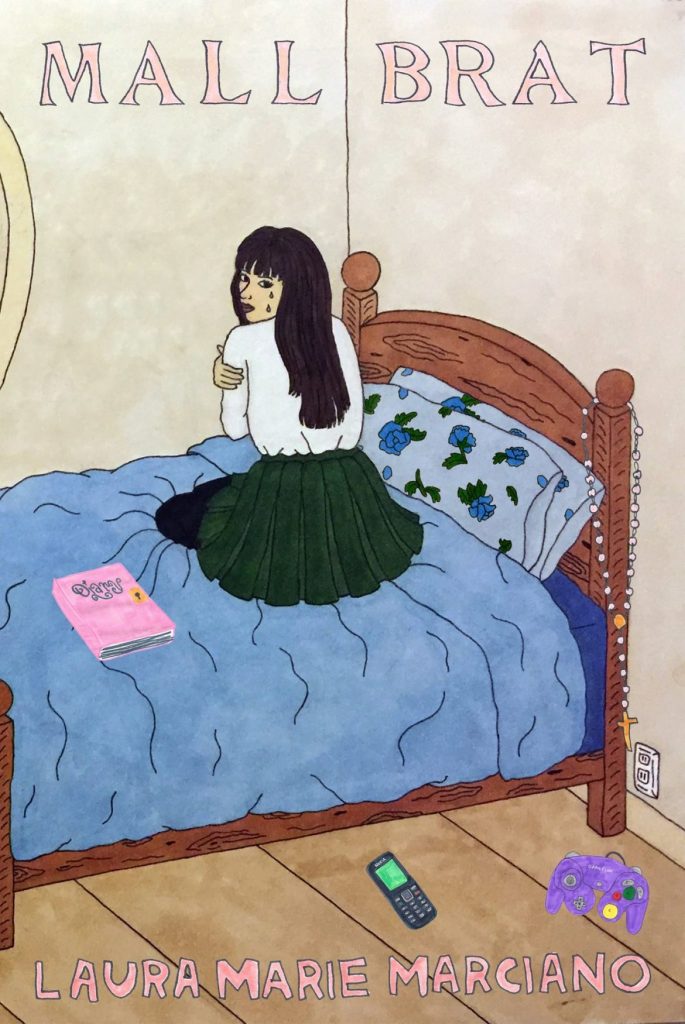
Laura Marie Marciano’s Mall Brat demands attention be paid to the crashing sounds of brand-centered adolescence, where the “I” is a cheap plastic spring wound so tightly around politics, family, gender, ethnicity, and sex that it can do nothing but snap. The tightness of the “I” in Mall Brat, and its pleading, searching voice challenges; it challenges the intrinsic, often uncommunicated, hazards of Louis Vuitton and Disney-fied pop-cultural references with copied images of Princess Aladdin’s Jasmine aside a poem entitled, “No Petals Left on a Dying Rose.” It challenges sexual preparedness within the context of familial, individual, and national identities. Moreover, Mall Brat explodes language, and Marciano’s explosions are firecrackers bursting into the energizing, powdery granularity of sour pixie-sticks sucked down at concession stands and in friends’ basements. What else can a beautiful book of poetry hope to do?
Marciano’s work blends an incredibly precise and wide knowledge of local, middle-class Rhode Island references (the image of an Elmhurst Little League jacket was jarring, to say the least), highly academic nods towards Foucault’s biopower in “Please Stop Touching Me,” and to Judith Butler in “Sugar,” among others. In “Sugar,” Marciano writes:
I really can’t get over
how my skin broke out
like Sappho crying
at a domestic trial
or Judith Butler
lecturing on Gender Trouble
to those who have just broken
the ‘Prom Promise’
pretty is after all
a privilege that is hereditary
Colliding academic references with phrases and images like “Prom Promise” reveal issues hidden in the heart of a nascent, class conscious “I”, at once acknowledging the power which arrives at the collision of these elements, but also striking devastating criticism at the ultimate failure of academic thought and theory to remedy tribulations in middle-class life. In this way, Marciano draws together the importance of active, useful education, and the cathartic mode of poetry.
Marciano’s tongue-in-cheek style enacts Gayatri Spivak’s term “affirmative sabotage”; it infiltrates hazily shared knowledge of national icons and iconic events and flips them around through the adolescent “I” who assumes a prescient role. Suddenly, “playing Beauty and the Beast,” feels gritty. And Jasmine? What the hell is she teaching us? Monica Lewinsky is a (wrongfully?) shamed slut instead of made into a joke, and Marciano positions sexual awakenings, insecurities, and pervasive woman-on-woman competition within the poem, “Monica Lewinsky”:
Only Cait agrees with me about this
the 21-year-old
intern slut shamed
by the President and his wife
her béret on trial for over twenty years
let her ride from the ashes, our god
assemble the virgins against powerful men
a parade of Brad or Bradley through the street
burned by our passion alone
The President (and his wife) enacts violence upon the assumed youthful innocence of an intern, and yet the incident between Lewinsky and Clinton cast the intern in red, guilty light. When we all take a moment to stop laughing about whether the “I did not have sexual relations…” statement is true, we’re forced to reconcile culpability and innocence in an image representative of the nation’s identity and power; Marciano calls attention to the glaring miscarriage of justice, how, through the politics of male power, Lewinsky’s female sexuality was rebranded as divisive, lewd, and succubine.
Laura Marie Marciano’s poetical acrobatics surprise the reader as much as her content, and her form is complimented by the conjuring of crystalline images in determined irony to make the reader accountable for their role in the process of acculturation and gendering. In “What Was Once Our Whole Lives Is Now Only a Part,” Marciano writes:
my father always lied about my age
for free entrance to amusement parks.
I pulled my dress up to show everyone
black and white cookies, Kool-Aid, and chlorine.
can you imagine a time before chlorine.
Despite the shock of a father lying about his daughter to gain something, or the easy resistance one may have to associating chlorine and Kool-Aid, Marciano connects these gluts of innocuous poisons accumulating beneath our cotton clothes and made-up smiles.
Nuanced, minimalist images of trophies and shopping bags dapple Mall Brat and speak to the heart of commercial culture, family, and gender formation; they are interspersed with Disney and family and thoughtful, anxious political probing. The inescapable ethos Marciano generates is heartbreaking and profoundly true; she speaks the sharp and seemingly-simple (although Spivak teaches us that “plain prose cheats”) language of a generation and is guaranteed to invite reluctant poetry readers into her work. Mall Brat pleads with the millennial generation, with the baby boomers, with gen-xers, to understand themselves, how they arrived, and where their next destination will be.
***
Mall Brat
by Laura Marie Marciano
Civil Coping Mechanisms; 120 p.
Follow Vol. 1 Brooklyn on Twitter, Facebook, and sign up for our mailing list.
